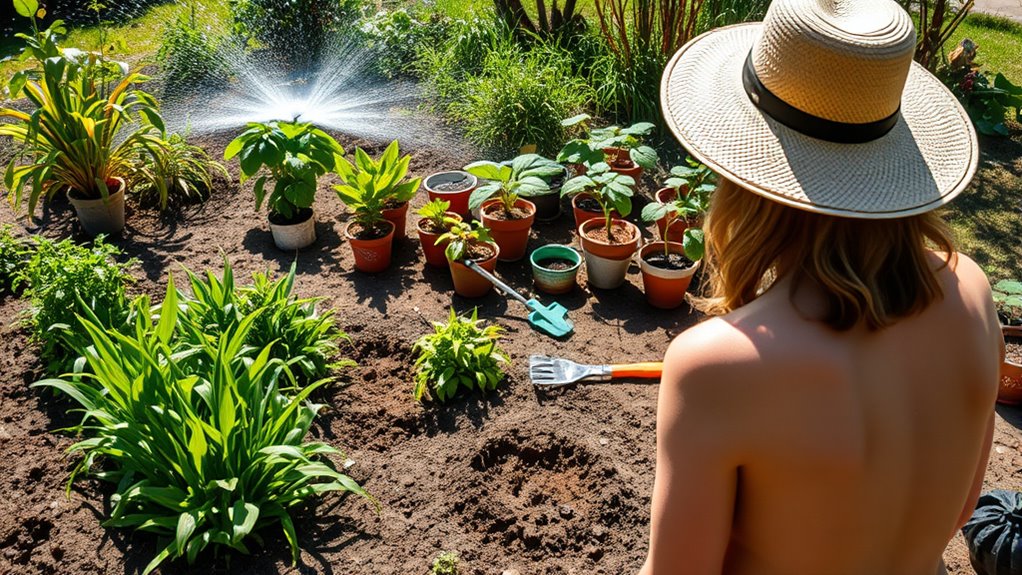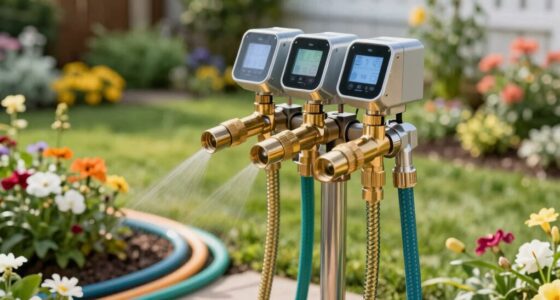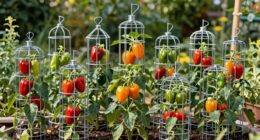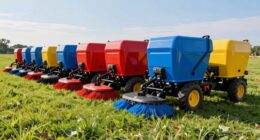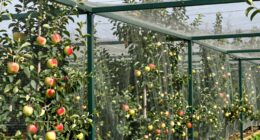To avoid common gardening mistakes, make sure to assess your soil first by testing pH and nutrients, then improve it with compost or organic matter. Don’t ignore pests—use preventative measures like companion planting and inspect regularly. Plant at the right time for your climate, avoid rushing into planting, and choose beginner-friendly varieties. Be consistent with watering, checking moisture levels to prevent over- or underwatering. Keep these tips in mind, and you’ll set yourself up for success and a thriving garden.
Key Takeaways
- Skipping soil testing and neglecting soil improvement can hinder plant growth.
- Ignoring pest prevention and delaying treatment can cause significant damage.
- Planting at unsuitable times or conditions reduces success; understanding climate and plant needs is crucial.
- Overwatering or underwatering without checking soil moisture can harm plants.
- Neglecting proper planning, patience, and continuous learning limits gardening success and enjoyment.

Starting a garden can be exciting, but beginners often make mistakes that hinder their success. One of the most common errors is neglecting proper soil preparation. Your soil is the foundation of your garden, so it’s essential to assess its quality before planting. Avoid skipping this step; instead, test your soil to determine its pH and nutrient levels. If the soil is compacted or lacks essential nutrients, take the time to improve it. Incorporate organic matter like compost or aged manure to enrich the soil, making it more fertile and better-draining. This effort helps your plants establish strong roots and thrive from the start, reducing the likelihood of problems later on.
Assess your soil first—test pH and nutrients, then enrich with compost for healthy, thriving plants.
Another mistake beginners make is ignoring pest management. Many new gardeners either wait too long to address pests or don’t implement preventative strategies. Instead of reacting only when pests appear, take proactive steps to keep them in check. Use natural deterrents, such as companion planting, which involves growing certain plants together to repel pests. For example, marigolds can deter nematodes and aphids. Keep your garden clean by removing debris, fallen leaves, and weeds that can harbor pests. Regular inspection is essential—check your plants frequently for signs of trouble, like chewed leaves or discolored foliage. When pests do show up, opt for gentle, environmentally friendly solutions like insecticidal soap or neem oil, rather than immediately reaching for harsh chemicals. This approach preserves beneficial insects and maintains a healthy balance in your garden ecosystem.
Avoid the temptation to plant too early in the season or in unsuitable conditions. Knowing your local climate and understanding the specific needs of your plants can prevent disappointment. Starting with easy-to-grow varieties suited for beginners can boost your confidence and success rate. Remember, gardening is a learning process, and mistakes are part of that journey. Be patient and observant, adjusting your practices as you gain experience. Additionally, consider using self-watering plant pots, which can help maintain consistent moisture levels and reduce watering mistakes, especially for beginners still learning their plant’s needs.
Finally, don’t overlook the importance of watering correctly. Overwatering can drown roots and promote disease, while underwatering can stress plants and stunt growth. Establish a consistent watering schedule based on your plant’s needs and weather conditions, and always check the soil moisture before watering again. By focusing on proper soil preparation, diligent pest management, and attentive care, you set yourself up for a more rewarding gardening experience and healthier plants. These foundational steps make all the difference in avoiding common beginner mistakes and enjoying the fruits of your labor.
Frequently Asked Questions
How Do I Choose the Right Plants for My Climate?
To choose the right plants for your climate, start by checking their plant hardiness zones to guarantee they can survive your area’s temperatures. Consider microclimate considerations like sun exposure, wind, and moisture levels, which can affect plant growth. Observe your garden’s conditions throughout the year, and select plants suited to those specific factors. This way, you’ll promote healthy growth and enjoy a thriving garden tailored to your environment.
What’S the Best Way to Prevent Pests Without Chemicals?
Imagine your garden as a peaceful sanctuary, where pests are unwelcome guests. To keep them at bay naturally, try companion planting—pairing plants that repel pests with those they dislike. Encourage beneficial insects like ladybugs and parasitic wasps, which act as natural pest control. Avoid chemicals by promoting healthy soil and plant diversity. These methods create a balanced ecosystem, letting your garden thrive without harmful substances.
How Often Should I Water Different Types of Plants?
When considering watering frequency, you should tailor it to each plant’s needs for ideal plant hydration. Most vegetables and flowers prefer consistent moisture, about once or twice a week, while succulents need less frequent watering, roughly every two weeks. Always check the soil moisture before watering—if it’s dry a couple of inches down, it’s time to water. Proper watering habits promote healthy growth and prevent over- or under-watering issues.
When Is the Ideal Time to Fertilize My Garden?
You should fertilize your garden when plants need a boost, typically during active growth periods. Before applying fertilizer, conduct a soil testing to determine nutrient levels, helping you choose the right fertilizer types. Whether you opt for organic or synthetic options, timing matters—fertilize in early spring or mid-season for best results. Regular, thoughtful feeding promotes healthy growth, vibrant blooms, and bountiful harvests, turning your garden into a thriving paradise.
How Can I Improve Soil Quality Naturally?
To improve your soil quality naturally, start with composting techniques to create rich organic matter. Regularly add organic soil amendments like compost, aged manure, or leaf mold to boost nutrient levels. Avoid synthetic fertilizers, which can harm beneficial microbes. Turn your compost regularly to speed up decomposition. Over time, these practices will enhance soil structure, increase fertility, and promote healthy plant growth, making your garden more productive and sustainable.
Conclusion
Avoiding common gardening mistakes can make your planting journey more successful and enjoyable. Remember, nearly 60% of novice gardeners give up within their first year due to simple errors like overwatering or poor soil prep. By learning from these pitfalls, you boost your chances of thriving. Keep patience, stay curious, and don’t be afraid to experiment. With a little effort, your garden will flourish, rewarding you with beauty and satisfaction you’ll cherish for seasons to come.
